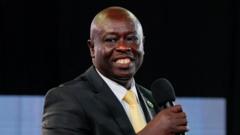Kenyan Deputy President Rigathi Gachagua's impeachment trial faced an unexpected delay as he was hospitalized shortly before he was scheduled to mount a defense in the Senate. His lawyer, Paul Muite, confirmed that Gachagua had fallen ill, prompting a suspension of the proceedings until 5 PM local time. The absence of Gachagua in a trial already limited by time constraints has raised concerns among lawmakers about meeting the required timeline for the decision.
The proceedings, which began on Wednesday with Gachagua pleading not guilty to 11 charges—including corruption, inciting ethnic divisions, and undermining the government—are under significant scrutiny. Last week, the National Assembly overwhelmingly voted in favor of his impeachment, with attention shifting to the Senate for the trial.
Parliament Speaker Amason Kingi acknowledged the urgency of the process, emphasizing that the trial could not be extended beyond Friday. He noted that if Gachagua fails to attend, the Senate could choose to continue without his presence, thus allowing a vote on the impeachment motion to proceed.
The growing rift between Gachagua and President William Ruto, only two years after their joint election, has been pivotal in this conflict. The tensions escalated in June, when Gachagua criticized the intelligence agency's failure to properly brief Ruto during mass protests against unpopular tax hikes. This incident played a crucial role in fracturing their political alliance.
The case against Gachagua features serious allegations, with central claims pointing to a substantial accumulation of wealth through corrupt practices—reportedly worth 5.2 billion Kenyan shillings (about $40 million). Lawmakers have articulated these accusations as extraordinary misconduct that justifies the impeachment process. The opposition has rallied support for the motion, ensuring a challenging environment for Gachagua as he navigates the legal and political repercussions of the trial.
Given the charged atmosphere surrounding these proceedings, many observers anticipate that the deputy president's impeachment may proceed, especially if opposition members align with the ruling coalition as seen in the National Assembly vote. Gachagua has pledged to contest any unfavorable decision, signaling a potential deepening of Kenya's political divide.
As the trial unfolds, there has been speculation over possible successors, including current governors and high-ranking ministers, further emphasizing the significance of this impeachment process not only for Gachagua but for Kenya's political landscape moving forward.




















